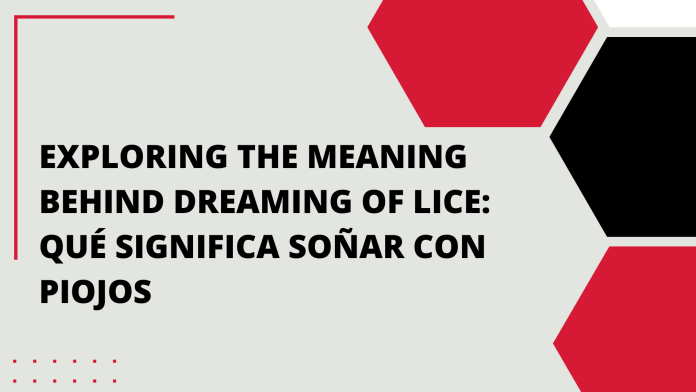Dreams have long intrigued and puzzled humans. They can be a source of wonder, fear, and curiosity. But what happens when you dream of something as common and yet unsettling as lice? In this article, we will delve into the intriguing world of dreams and explore the Qué Significa Soñar con Piojos. From cultural interpretations to psychological insights, we will uncover the hidden messages that may lie within these dreams.
Understanding the Symbolism of Lice
1. The Annoyance Factor
Dreams about lice often start with a sense of irritation. You may find yourself scratching your head in your dream, much like you would in real life. This initial annoyance can be symbolic of something that’s been bothering you in your waking life.
2. Personal Relationships
Lice are notorious for spreading from person to person, often within close-knit groups. Dreaming of lice might reflect concerns or issues within your personal relationships, particularly if you feel like something is “spreading” or causing discord among your friends or family.
3. Feelings of Guilt and Impurity
In some cultures, lice are associated with impurity and guilt. Dreaming of lice could indicate that you’re grappling with feelings of guilt or that you believe you’ve done something wrong.
4. Self-Doubt and Insecurity
Lice infestations can be embarrassing, and dreaming of them may be a manifestation of your own insecurities. It could be a sign that you’re feeling self-conscious or doubting your self-worth.
Analyzing the Psychological Aspect
5. Stress and Anxiety
Dreaming of lice can often be linked to heightened stress and anxiety levels. It’s possible that external stressors are infiltrating your subconscious mind, causing these unsettling dreams.
6. Repressed Emotions
Sometimes, dreams serve as a channel for repressed emotions. Dreaming of lice may indicate that you have unresolved issues or emotions that need addressing.
7. Fear of Infestation
For some, lice represent a fear of infestation or contamination. This fear can be connected to feelings of vulnerability or a lack of control in one’s life.
Common Interpretations Across Cultures
8. Loss of Control (Asian Cultures)
In some Asian cultures, lice are seen as a symbol of losing control over one’s life. Dreaming of lice may suggest that you are experiencing a period of chaos or unpredictability.
9. A Need for Cleansing (African Cultures)
In certain African cultures, lice are associated with the need for spiritual cleansing. Your dream could be telling you that it’s time to cleanse your spirit or address negative influences.
10. Family Troubles (European Cultures)
In European cultures, lice in dreams may be linked to family troubles or conflicts. It might be a signal to pay more attention to your family relationships.
How to React to These Dreams
11. Self-Reflection
If you frequently dream of lice, it may be worth engaging in some self-reflection. Consider the aspects of your life that may be causing stress, guilt, or insecurity.
12. Open Communication
If personal relationships seem to be a recurring theme in your dreams, it might be time to engage in open communication with those close to you. Address any conflicts or concerns you have.
13. Stress Management
To reduce stress-related dreams, practice stress management techniques such as meditation, exercise, and relaxation exercises.
14. Seek Professional Help
If these dreams persist and significantly affect your well-being, consider seeking the help of a therapist or dream analyst who can provide guidance and interpretation.
15. Conclusion: Embracing the Messages of Our Dreams
In conclusion, dreaming of lice can be a perplexing and even disconcerting experience. However, it’s essential to remember that dreams often serve as a mirror to our subconscious minds. By paying attention to the messages they convey, we can gain valuable insights into our inner thoughts and emotions.
FAQs
1. Are dreams about lice always negative?
Not necessarily. While dreams about lice can be unsettling, they can also be a way for your subconscious mind to alert you to unresolved issues or emotions.
2. Can dream interpretation be culturally specific?
Yes, the interpretation of dreams can vary across cultures. Different cultures may associate different meanings with common symbols like lice.
3. What if I have recurring dreams about lice?
Recurring dreams about lice may indicate that there is a persistent issue in your life that needs addressing. Consider seeking professional help or engaging in self-reflection.
4. Are there any positive interpretations of dreaming about lice?
While lice dreams are often associated with negative emotions, they can also serve as a catalyst for personal growth and self-improvement.
5. How can I remember my dreams better for interpretation?
Keeping a dream journal and practicing relaxation techniques before sleep can help you remember and analyze your dreams more effectively.
Unlock the mysteries of your dreams and the hidden meanings behind them. Dive into the world of dream interpretation, and remember, even the most perplexing dreams can hold valuable insights about our inner selves.

